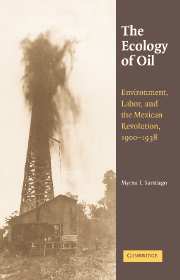Book contents
- Frontmatter
- Dedication
- Contents
- List of Maps, Figures, Tables, and Appendices
- Acknowledgments
- Introduction
- PART ONE THE HUASTECA BEFORE OIL
- PART TWO THE ECOLOGY OF OIL
- PART THREE CHALLENGING THE ECOLOGY OF OIL
- Conclusion
- Epilogue
- Appendices
- A Note on the Sources
- Archives Consulted
- Selected Bibliography
- Index
Epilogue
Published online by Cambridge University Press: 05 March 2015
- Frontmatter
- Dedication
- Contents
- List of Maps, Figures, Tables, and Appendices
- Acknowledgments
- Introduction
- PART ONE THE HUASTECA BEFORE OIL
- PART TWO THE ECOLOGY OF OIL
- PART THREE CHALLENGING THE ECOLOGY OF OIL
- Conclusion
- Epilogue
- Appendices
- A Note on the Sources
- Archives Consulted
- Selected Bibliography
- Index
Summary
The Mexican cannot develop their own oil industry. They have neither the money, the constructive or mechanical ability, the inclination to follow sound technical advice nor the necessary practical sense.
Geologist Charles Laurence Baker, 1926El presidente de la Confederación Patronal de la República Mexicana, Alberto Fernández Garza, se lanzó de lleno ayer, al sostener que se tiene que privatizar PEMEX…México, dijo, debe quitarse la “falsa máscara de la soberanía” o se quedará pobre.
La Jornada, July 29, 1999¿Por qué vamos a creerle a funcionarios del PEMEX privatizado, si toda la perforación de Campeche y Tabasco los extranjeros han desplazado a los mexicanos? ¿Qué las contrucciones y reparaciones se las dan a los extranjeros asiáticos, corriendo a los mexicanos con la complicidad de los líderes? ¿Qué la inmensa riqueza en gas de la Cuenca de Burgos se la dieron a españnoles y norteamericanos, dejando a los petroleros de Reynosa las migajas?
Pedro Aníbal Ramírez and Eduardo Carrillo R., August 12, 2004As dawn approached on March 19, 1938, the future was a mystery. Cárdenas had analyzed the situation in Europe correctly, figuring that the rise of fascism and its drums of war would preclude foreign military intervention to rescue the oil companies. He was less forthcoming, however, on what he had in mind for the nationalized industry. The workers, by contrast, took control of daily industry operations immediately and assumed that workers' management would be the rule. Given the history of relations between the oil workers and the Mexican revolutionary state, however, a long lasting agreement was highly unlikely. Thus, it was no surprise that the joy of March 19, 1938, was short-lived. The central issue of contention was the same that had deadlocked contract negotiations between the companies and the STPRM, namely, workers’ control.
Friction between the workers and the government over industry control began within a month of expropriation. While they made every effort to keep the industry running despite a lack of spare parts and the companies' international boycott against the Mexican industry, workers protested the number and quality of officials appointed to management positions.
- Type
- Chapter
- Information
- The Ecology of OilEnvironment, Labor, and the Mexican Revolution, 1900–1938, pp. 349 - 356Publisher: Cambridge University PressPrint publication year: 2006



